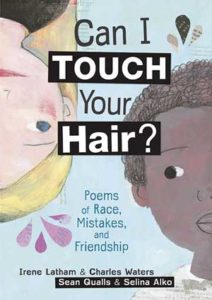Can I Touch Your Hair?: Poems of Race, Mistakes, and Friendship
Reviewed by Julia Copeland
May 1, 2019
 By Irene Latham and Charles Waters, illustrated by Sean Qualls and Selina Alko. Carolrhoda Books, 2018. 40 pages. $17.99/hardcover; $9.99/eBook. Recommended for ages 8 and up.
By Irene Latham and Charles Waters, illustrated by Sean Qualls and Selina Alko. Carolrhoda Books, 2018. 40 pages. $17.99/hardcover; $9.99/eBook. Recommended for ages 8 and up.
The cover of Can I Touch Your Hair? is deceptive. At first glance, it appears to be a picture book aimed toward young children, but the content of this book goes much deeper and would best inspire discussion with older, middle grade children. The book is actually a compilation of back-and-forth poems between two students, one white and one black, who are matched for a writing project. Through their poems, they grow to know each other better and become friends, exchanging poems about everything from food, hair, and church to microaggressions, cultural appropriation, and the n-word.
When choosing books for our school library, I am always on the lookout for new books with main characters of color, especially books that move beyond slavery and the Civil Rights Movement to show children going about their daily lives today. In my search for these books, I am also careful to assess whose voice is being presented. Is it an “own voices” book? Are the diverse characters’ voices authentic, and are they written by an author who identifies as part of that same race or culture? Can I Touch Your Hair? meets this criteria. Not only are the poems of the white girl and black boy written by a white woman and black man, the book is also illustrated by a white woman and black man as well. For me, this was a really important point to recognize as I read the book and then recommended it to co-workers and students.
Can I Touch Your Hair? is not only a wonderful story, it is a great jumping-off point for talking with children about race and privilege, commonalities and differences. I plan to use parts of it for our middle school racial identity lessons and will encourage teachers to use it as a read aloud in their classrooms. One of the best ways to reduce racial bias is to spend time with or get to know people who are different from ourselves. One powerful way we can do this is through literature. This book can be an insightful part of that journey.



Comments on Friendsjournal.org may be used in the Forum of the print magazine and may be edited for length and clarity.